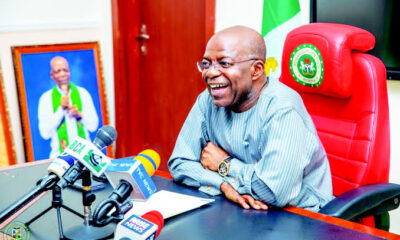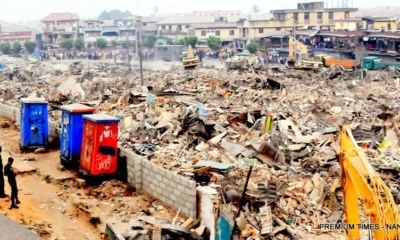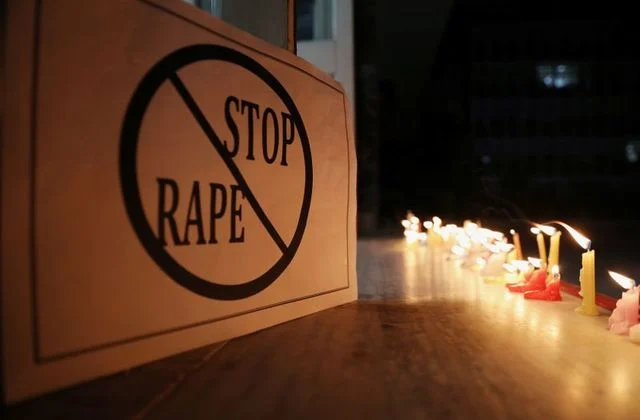Africa
The Urgency Of An Emergency -By Abiodun Komolafe
It is no longer news that the urgency of the housing emergency demands a more proactive approach. But what concrete steps are being taken by Osun’s leaders to genuinely improve citizens’ lives, beyond loitering around and taking pictures? Are there initiatives aimed at promoting housing affordability, infrastructure development and economic empowerment in a holistic manner? On a broader scale, how can the Federal Government collaborate with state and local governments to implement impactful solutions that benefit the citizens?

I was out of town last Saturday when a sudden phone call shattered my plans for the weekend. My co-tenant informed me of a shocking rent hike by a staggering 75% increase! In one fell swoop?
In a letter to that effect, the Estate Agent, or ‘Caretaker’, as they are called in this part of the world, added a caveat, which more or less sounded like a formal threat: “In view of this, we hereby review the rent to N350,000.00 (Three hundred and fifty thousand naira) only for your subsequent tenancy period commencing from 10th November, 2025; if you so desire to remain in occupation of the apartment.” He then ended on a ‘friendly’ note by thanking me “in anticipation of” my “understanding in this regard.”
Well, this juxtaposition of politeness and ultimatum struck me as peculiar. It’s reminiscent of advanced countries where security agents greet you with a smile, thank you for your cooperation, and wave goodbye – as you head to prison.
Honestly, the increase wasn’t just a personal blow, it was a notorious reminder of Nigeria’s economic murk. Just three years ago, my rent for the three-bedroom flat jumped from N160,000 to N200,000, and this latest increase is yet another telltale sign of the country’s precipitous economic decline. As I wrestle with the implications of this crisis, I’m compelled to ask: what does this say about our collective reality?
Two proverbs come to mind: ‘Bí erin bá je tí ò yó, ìgbé lojú ó tì.’ (When the elephant eats but not to satisfaction, the bush around it takes the shame); and, ‘Tí a bá bá olówó rìn tí a kò yó, ìbárìn tálákà kò leè pa ni lébi’ (If one’s association with a wealthy man doesn’t bring liberation from poverty, a switch of allegiance to the poor will not make a significant difference). While these are matters for another time, this personal experience sheds light on the broader narrative of Nigeria’s emergencies, where economic instability threatens the very fabric of society.
For Nigeria, the housing crisis is a ticking time bomb, threatening the very fabric of our society. The numbers are staggering: millions of people are homeless, living in substandard conditions, or struggling to pay rent. This is not just a statistical anomaly; it represents a human tragedy, with individuals and families forced to sacrifice dignity, health and opportunities due to unaffordable housing. The crisis is not limited to urban slums; it permeates every aspect of society, from the streets of major cities to rural communities.
In Ijebu-Jesa, Osun State, the cost of construction materials has reached alarming levels. For example, a tipper load of sand costs N100,000.00, while ‘Okini’ brand of the sand ranges from N120,000 to N140,000. Cement bags are priced between N10,300 and N10,500. Constructing a well in my Native Nazareth can cost as much as N800,000, and the construction of a borehole can reach up to N1,600,000.
The rent for a room-and-parlour ‘self-con’ in Ilesa can be as high as N250,000 per year. In Osogbo, the site of the incident, it is even higher, perhaps due to its capital city status.
In the Abule Egba axis of Lagos, the rent for a room ‘self-con’ shuttles between N250,000, and N300,000. In the Ajah axis, it goes for as much as N1m. A shop in the Onigbongbo area of Lagos, which used to cost N250,000, is now N500,000. Additionally, tenants are expected to pay an Agreement Fee of N250,000. Commission of N250,000. Damages of N150,000, and Caution Fee of N150,000. Amidst these, Lagos States’ minimum wage hypocritically stands at N85,000.
In an effort to address this issue, the Elegboro of Ijebu-Jesa, and the paramount ruler of Egboroland, Oba Olufemi Agunsoye, reportedly invited sand dealers in the community for a discussion on reducing sand prices. Sadly, this initiative had little impact, and prices continue to soar. It’s a harsh reality where prices can change overnight, leaving residents to cope with the consequences. This trend has taken a toll on the community, making it increasingly difficult for people to afford basic necessities like housing.
On his part, the Owa Obokun of Ijesaland, Oba Adesuyi Haastrup, has promised to reduce the cost of building materials in Ijesaland by regulating gravel and sand prices. He also plans to assist dealers with heavy-duty earth-moving machines to ease operations, which should help crash prices. While identifying high costs of gravel, sand and hardcore materials as a factor driving investors away from Ijesaland, Oba Haastrup seeks to address this challenge to attract more investments and promote development in his kingdom.
Indeed, the housing wahala is a global phenomenon which transcends national borders and affects communities worldwide. From the gentrified neighborhoods of San Francisco to the informal settlements of Mumbai, the struggle for affordable housing is a unifying thread. The crisis is fueled by the increasing globalization of real estate markets, where speculative capital flows freely across borders, driving up prices and displacing long-time residents. This has led to a transnational class of investors and developers who place profits over people, making existing inequalities worse and creating new ones. Only international cooperation and solidarity can help ensure that housing is treated as a fundamental human right, rather than a commodity for the wealthy.
Closer to home, at 64, Nigeria still contends with a significant housing deficit. The ‘Housing for All by the Year 2010’ initiative failed to achieve its goal, primarily due to the country’s population outpacing housing development. The National Housing Policy (2012) emphasized mass housing development, but its implementation has been slow due to funding constraints, land availability and regulatory challenges.
The National Social Housing Programme aims to build 300,000 affordable houses, but its progress is unclear, while the Renewed Hope Cities and Estates Programme (2023) targets 50,000 housing units. Only God can tell if the initiative has taken off!
The Federal Housing Authority and Family Homes Funds Limited are involved in various housing projects, but their impact is limited by the scale of Nigeria’s housing needs, slow implementation, infrastructure deficits and lack of fulfillment of previous governments’ promises. While initiatives like the National Housing Fund and other mass housing schemes have been launched, their effectiveness has also been questioned. The private sector’s focus on luxury housing rather than affordable options has further worsened the issue.
At a time like this, Lagos State’s experience with the 2011 Tenancy Law, introduced by former Governor Babatunde Fashola, serves as a microcosm of Nigeria’s housing challenges. It signposts the complexity of addressing the housing emergency through regulation, and the need for nuanced policies that balance tenant protection with investment incentives.
It is no longer news that the urgency of the housing emergency demands a more proactive approach. But what concrete steps are being taken by Osun’s leaders to genuinely improve citizens’ lives, beyond loitering around and taking pictures? Are there initiatives aimed at promoting housing affordability, infrastructure development and economic empowerment in a holistic manner? On a broader scale, how can the Federal Government collaborate with state and local governments to implement impactful solutions that benefit the citizens?
To conclude, the noise in town is that policymakers must consider the impact of oil price fluctuations, innovative solutions like sustainable building materials and alternative energy sources to address Nigeria’s housing crisis. Yes, rising oil prices and inflation worsen Nigeria’s housing crisis by increasing construction costs and eroding consumers’ purchasing power, while economic instability affects government revenue and growth. But, in a country where 75.5% of its citizens in rural areas live below poverty line, only through sustained effort and commitment can Nigerians address the housing crisis and build a more just and equitable society.
May the Lamb of God, who takes away the sin of the world, grant us peace in Nigeria!
*KOMOLAFE wrote in from Ijebu-Jesa, Osun State, Nigeria (ijebujesa@yahoo.co.uk; 08033614419 – SMS only)






![Human rights groups are concerned about further arrests amid continuing raids in the occupied West Bank [File: Jaafar Ashtiyeh/AFP]](https://www.africansangle.com/wp-content/uploads/2023/10/Human-rights-groups-are-concerned-about-further-arrests-amid-continuing-raids-in-the-occupied-West-Bank.webp)















